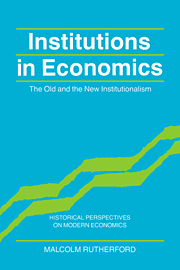5 - Evolution and design
Published online by Cambridge University Press: 12 January 2010
Summary
Within institutional economics, and within the social sciences in general, reference is often made to the social and economic functions that various institutions perform, either for particular groups or for society as a whole. Fundamentally, institutions are considered necessary to the very existence of an orderly, functioning, social and economic system. Institutions are frequently presented as constraining the operation of self-interest and preventing society from degenerating into a Hobbesian war of all against all. Douglass North (1981: 11) has put it bluntly: a purely “individualistic calculus of costs and benefits would suggest that cheating, shirking, stealing, assault and murder should be everywhere evident.” When J. R. Commons (1950: 104, [1924] 1968: 138) writes of institutions as rules that generate a “workable mutuality” out of conflict of interest and create a “security of expectations,” he is making essentially the same point. Similarly, Alchian and Demsetz (1973: 16) argue that institutions provide ways of “resolving the social problems associated with resource scarcity” and related conflicts of interest, and that institutions “help a man form those expectations that he can reasonably hold in his dealings with others” (Demsetz 1967: 347).
Similar things are also said in other ways: that institutions provide a basis for action in a world that would otherwise be characterized by pervasive ignorance and uncertainty (Hayek 1973: 11–18; O'Driscoll and Rizzo 1985: 6); that institutions create a degree of standardization and predictability of behaviour (Mitchell 1910b; Heiner 1983); that they solve recurrent coordination problems (Lewis 1969), prisoners' dilemmas (Ullmann-Margalit 1977; Schotter 1981), or other similar types of problem.
- Type
- Chapter
- Information
- Institutions in EconomicsThe Old and the New Institutionalism, pp. 81 - 128Publisher: Cambridge University PressPrint publication year: 1994



